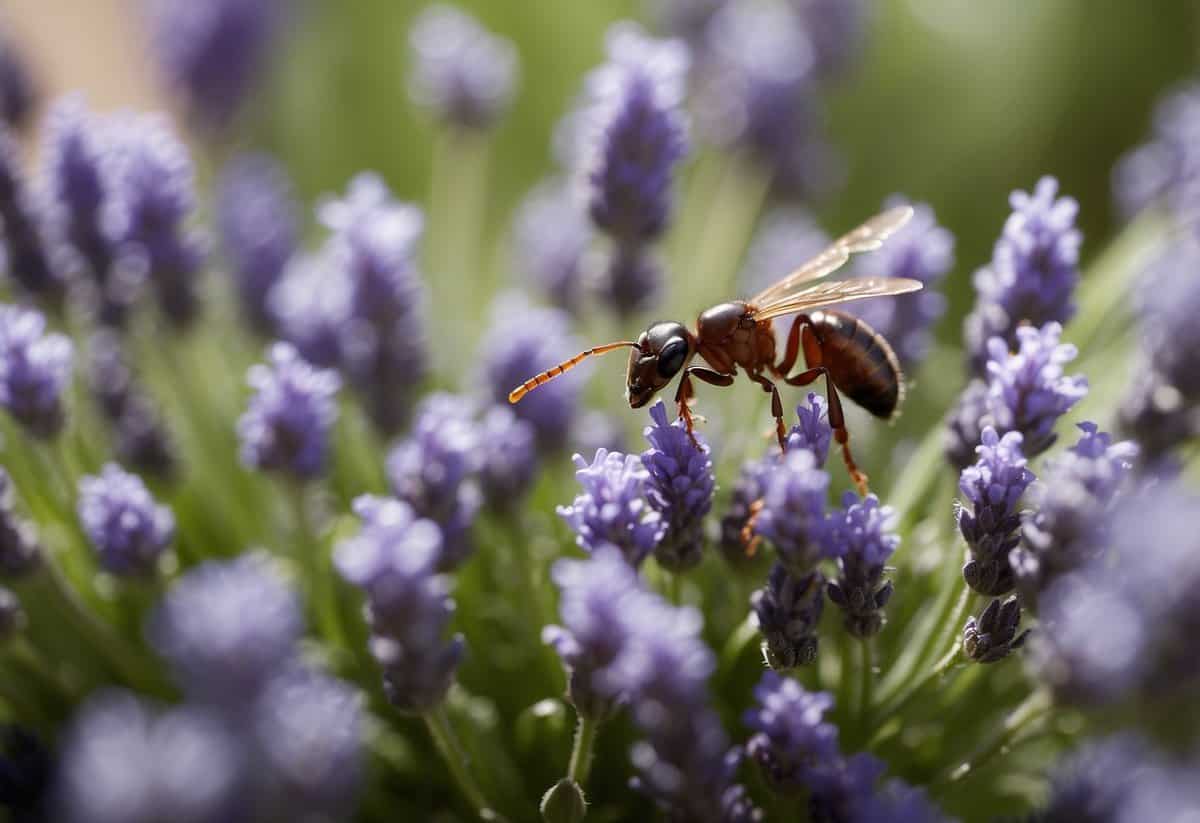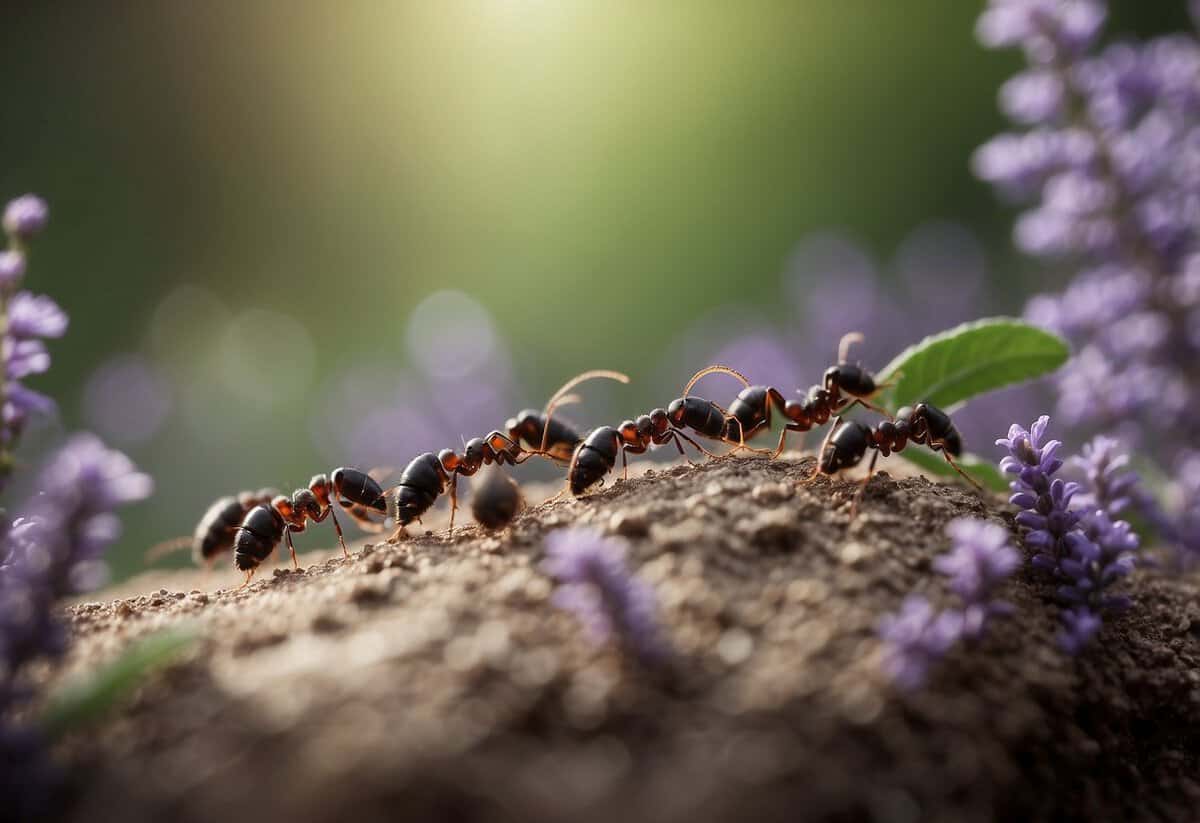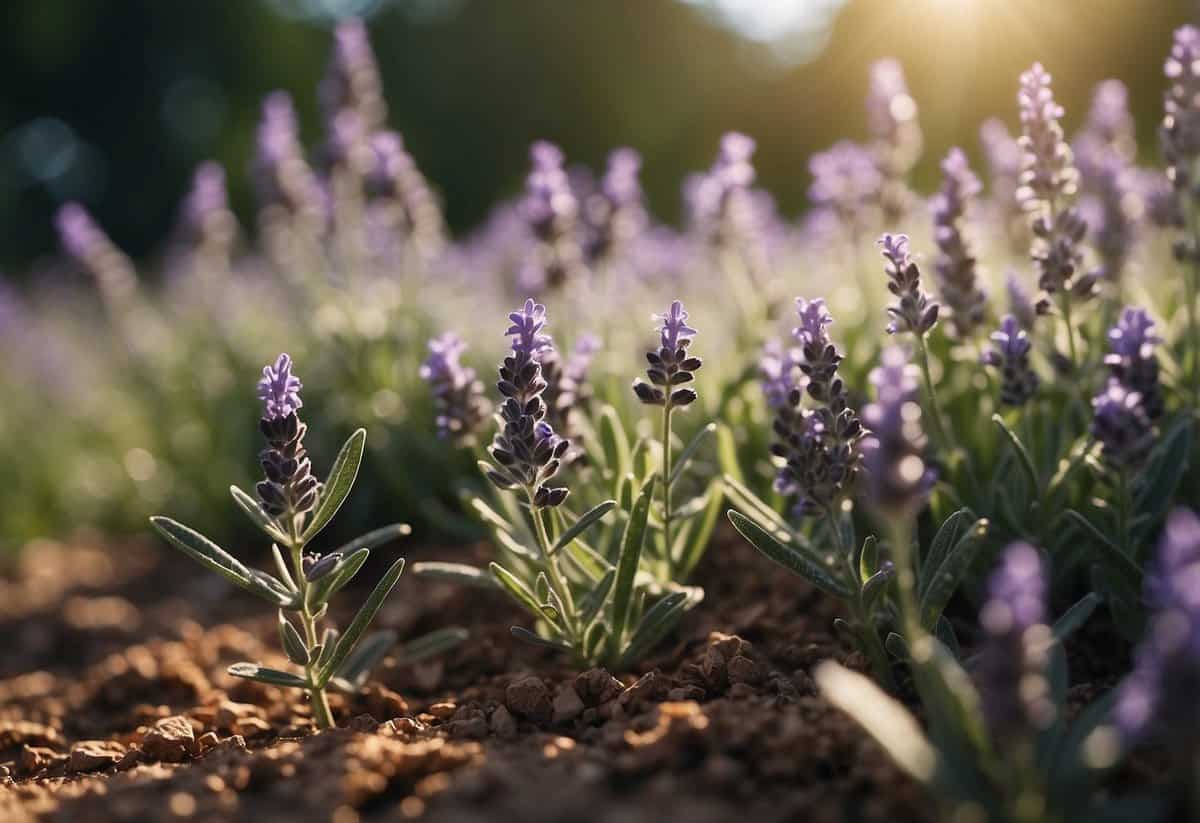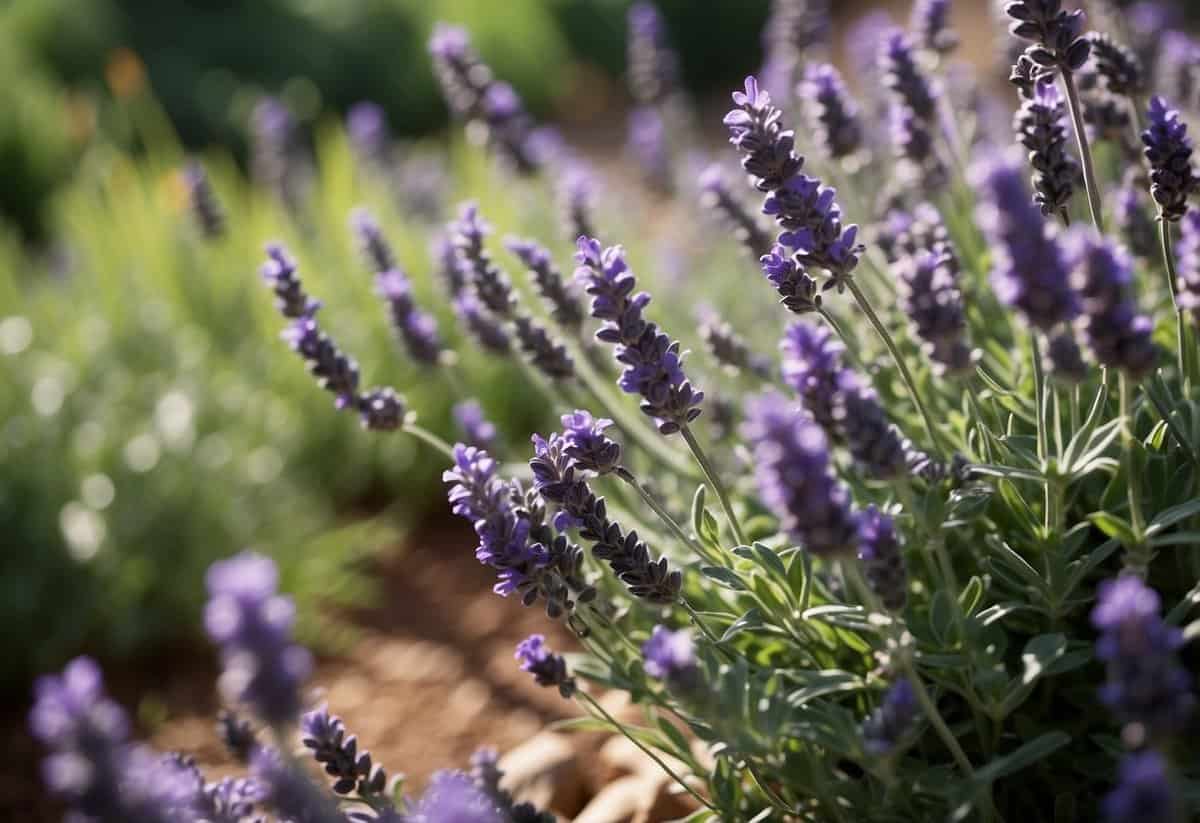Do Ants Hate Lavender? Discover How It Affects Them
Do ants hate lavender? Yes, ants do hate lavender. This fragrant plant isn’t just a favorite in gardens and homes for its lovely scent; it’s also a powerful ant repellent. Imagine placing a few pots of lavender around your home and watching as the ants steer clear. Sounds like a win-win, right? You’ve got beauty and a natural form of pest control.

But that’s not all! Lavender isn’t the only plant that can keep ants at bay. Mint also does a great job of repelling these pesky insects. Whether you prefer using essential oils or planting these herbs in your garden, you’re embracing nature’s way of pest control without the need for chemicals.
Take a stroll through your local garden center and grab some lavender or mint. You’ll not only enjoy their delightful scents but also appreciate how effective they are in keeping ants out of your home. Curious to learn more about how these plants work and other natural solutions to keep your space ant-free? Keep reading!
Understanding Ant Behavior and Scent Preferences

Ants use their sense of smell to navigate and communicate. Some scents like mint, cinnamon, and lavender can repel them by disrupting their scent trails.
The Olfactory System of Ants
Ants have a highly developed sense of smell. They use antennae to detect scents. These antennae have tiny hair-like structures called sensilla which contain scent receptors. With these receptors, ants can follow scent trails to find food and communicate with other ants.
Ants rely on pheromones for guidance. When an ant finds food, it leaves a pheromone trail so others can follow. This chemical communication is key to their survival and efficiency in gathering resources.
Common Scents That Ants Dislike
Certain smells can keep ants away. Mint, for example, is a strong repellent. Placing mint leaves or using mint oil around entry points can deter ants. Cinnamon is another scent ants hate. Sprinkling ground cinnamon or using cinnamon oil can disrupt their trails and deter them.
Vinegar is a natural cleaning agent and disrupts their scent trails. Lavender, while pleasant to humans, is disliked by ants and other insects. You can use lavender oil or plant lavender near entry points.
Interactions Between Ants and Plants
Some plants naturally repel ants. Lavender is a plant that can keep ants at bay. Planting lavender or using its oil can create a barrier against ants. Cinnamon, used by blending its powder with melted wax to make candles, disrupts their scent trails effectively.
Bay Laurel emits a strong odor that ants dislike. Crushed bay leaves can be sprinkled around to deter ants. These ant-repelling plants are a natural way to keep your home free from ants without using harsh chemicals.
Using plants and their oils strategically can help maintain a pest-free environment. By understanding how these scents work, you can choose the best natural repellents for your needs.
The Role of Lavender in Ant Repellence

Lavender plays a notable role in keeping ants at bay. Its essential oils and aromatic compounds are key to its effectiveness, and it compares favorably to other natural repellents like eucalyptus and clove.
Chemical Compounds in Lavender
Lavender contains several compounds that repel ants. The primary component is linalool, a substance known for its strong aromatic properties. Coumarin and camphor, also found in lavender, contribute to its effectiveness.
These compounds can interfere with the ants’ ability to communicate through scent trails. When you use lavender, it disrupts these trails, making it harder for ants to find their way.
Effectiveness of Lavender Oil
Lavender oil is a practical and strong ant repellent. You can place a few drops of lavender oil on a cotton ball and put it near ant trails or entry points. This method creates a barrier that ants are hesitant to cross.
You can also mix 5-10 drops of lavender oil with water in a spray bottle. This mixture can be sprayed around your home to keep ants away. Lavender oil’s scent is pleasant to humans but deterring to ants.
Comparing Lavender to Other Plant Repellents
Lavender is one of several plants known for their ant-repellent properties. Other popular choices include eucalyptus, thyme, clove, and rosemary. Each of these plants contains unique compounds that ants dislike.
For instance, eucalyptus has eucalyptol, while thyme contains thymol. These alternatives can be used similarly to lavender, but lavender stands out because it is easy to grow and versatile in its uses.
You can consider planting lavender around the perimeter of your home. This creates a natural and fragrant barrier, making it one of the most enjoyable ways to keep ants away.
Natural Ant Repellent Solutions and Recipes

Using natural solutions to repel ants can be effective and safer for your home. Lavender, combined with other essential oils and common household items, offers an easy way to keep ants at bay.
DIY Lavender Repellent
Lavender oil is a natural ant repellent due to its strong scent. To make a simple lavender spray, mix 10-15 drops of lavender essential oil with a cup of distilled water in a spray bottle. Shake well and spray the mixture on entry points, around windows, and along baseboards.
For an alternative method, soak a cotton ball in lavender oil and place it where you’ve seen ants. Replace these cotton balls every few days to maintain the scent’s effectiveness.
Combining Lavender with Other Scents
Combining lavender with other essential oils can create a more potent ant repellent. Lavender and peppermint oil work well together. Mix 10 drops of each oil with water in a spray bottle. Shake and use it in the same manner as the lavender spray.
Lavender and lemon oil is another effective combination. Lemon oil enhances the repellent properties due to its citrus scent, which ants also dislike. Use the same method as above with 10 drops of each oil.
For a stronger solution, you can add a few drops of clove oil, eucalyptus oil, or lemongrass oil. These oils increase the repellent’s power, but remember to keep it away from pets and children.
Safety and Preparation Tips
When preparing and using essential oil repellents, always keep safety in mind. Essential oils should be diluted before use to avoid irritation. If you have sensitive skin, wear gloves while handling the oils.
To avoid accidental ingestion by children or pets, spray the mixtures in areas that are out of their reach. It’s also a good idea to clearly label your spray bottles.
When mixing oils, ensure you use distilled water to avoid impurities. Using a funnel can help prevent spills and make the preparation process easier. Keep your DIY repellents in a cool, dark place to maintain their potency.
By following these simple recipes and tips, you can effectively and safely repel ants using natural ingredients. Remember to reapply these solutions frequently, especially after cleaning or heavy rain.
Practical Tips for Implementing Lavender in Pest Control

Lavender is a natural ant deterrent that can be used in several effective ways. By placing lavender around key areas and maintaining the plants properly, you can keep these pests at bay.
Effective Placement of Lavender Plants
Place lavender plants near entry points like doors and windows. Ants often enter homes through these areas, so the strong scent of lavender can deter them. If you have a garden, consider planting lavender around the perimeter to create a natural barrier.
In the kitchen, you can keep small pots of lavender on window sills and countertops. This not only helps to keep ants away but also adds a pleasant aroma to your cooking area.
Creating Barriers Using Lavender
Creating barriers with lavender can be done using both plants and essential oils. For outdoor areas, plant lavender around your home’s foundation to prevent ants from finding entry points. Add lavender oil to cotton balls and place them near doorways, windowsills, and any cracks where ants might enter.
In interior spaces like the kitchen, lavender sachets can be used in cabinets and around sinks. Ants dislike the scent and will avoid these areas, keeping your kitchen ant-free.
Maintenance of Lavender Plants for Continuous Control
To maintain the effectiveness of your lavender plants, regular care is essential. Prune the plants to keep them healthy and ensure they produce a strong fragrance. Water them regularly but avoid overwatering, as lavender prefers well-drained soil.
Keep the area around the lavender clean by removing dead leaves and flowers. This maintenance helps in sustaining the plant’s health and its pest control properties.
If using lavender oil, replace the cotton balls every few weeks to keep the scent strong. Maintaining fresh lavender sachets and oils ensures that the deterrent effect remains potent.
By following these practical tips, you can naturally deter ants and maintain a clean, pest-free environment in and around your home.
Additional Herbal Remedies and Practices to Deter Ants

There are many natural ways to help keep ants away from your home and garden. You can use herbs and spices, maintain cleanliness, and even plant strategically to create an ant-resistant environment.
Utilizing a Variety of Herbs and Spices
Certain herbs and spices can be very effective in repelling ants. Mint and peppermint are great choices. They give off a strong scent that ants dislike. Placing crushed mint leaves or peppermint oil near entry points can help.
Cayenne pepper and black pepper are also useful. Sprinkle these around areas where you’ve seen ants. The strong, spicy scent will push them away quickly.
Cinnamon and clove work similarly. You can place whole cloves or cinnamon sticks in cabinets and near windows. Ants avoid these areas due to their pungent smell.
Ensuring a Clean and Ant-Free Environment
Keeping your home clean is vital. Ants are attracted to food and sugary smells. Make sure to wipe down counters, clean up spills, and store food in sealed containers.
Keep lemon or citrus peels around your home. These peels contain natural compounds that repel ants. Leave dried, ground peels near entry points to keep these pests out.
Using essential oils like eucalyptus, tea tree oil, and lemongrass is another great option. Mix a few drops with water in a spray bottle and apply to entry points and other areas.
The Benefits of Companion Planting
Companion planting can also help keep ants at bay. Some plants naturally repel ants and other pests, such as flies and mosquitoes.
Planting marigolds near vegetable gardens and lavender near windows will help. These plants have scents that deter ants.
Using coffee grounds around your plants can be effective too. Ants dislike the texture and smell of coffee grounds.
Finally, consider using lemongrass and basil in your garden. These plants can work as a natural barrier against ants and enhance your gardening efforts.







